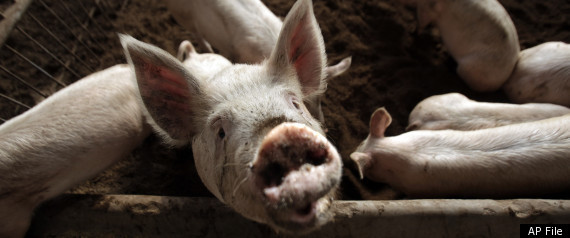
By ANDREW DUFFELMEYER 03/14/11 03:12 AM 
Read More: Activism, Agriculture Videos, Animal Abuse, Animal Abuse Videos, Animal Cruelty, Animals, Big Ag, Business, Farm Animal Abuse, Farm Animal Abuse Videos, Farm Animal Cruelty, Food, Iowa Agriculture,Politics, US News, Green News
DES MOINES, Iowa -- Angered by repeated releases of secretly filmed videos claiming to show the mistreatment of farm animals, Iowa's agriculture industry is pushing legislation that would make it illegal for animal rights activists to produce and distribute such images.
Agriculture committees in the Iowa House and Senate have approved a bill that would prohibit such recordings and punish people who take agriculture jobs only to gain access to animals to record their treatment. Proposed penalties include fines of up to $7,500 and up to five years in prison. Votes by the full House and Senate have not yet been set.
Doug Farquhar, program director for environmental health at the National Conference of State Legislatures, said Iowa would be the first state to approve such restrictions but Florida is considering similar legislation. The Iowa measure was introduced after a number of group released videos showing cows being shocked, pigs beaten and chicks ground up alive.
"It's very transparent what agribusiness is attempting to do here," said Bradley Miller, national director of the Humane Farming Association, a California-based group dedicated to protecting farm animals from abuse. "They're trying to intimidate whistleblowers and put a chill on legitimate anti-cruelty investigations. Clearly the industry feels that it has something to hide or it wouldn't be going to these extreme and absurd lengths."
Legislators and farming groups respond that they're only trying to prevent people from fraudulently seeking jobs in order to shoot videos that may give an unfair perspective on livestock operations. Rather than videotape and publicize abuse, supporters of the Iowa measure said people should report wrongs they see and work through proper channels to prevent them.
They point out that in cases such as at a hatchery in Spencer, where video of male chicks being tossed into grinders was secretly made in 2009, no complaints were filed.
"We believe this can help prosecute those people who, while they claim to have animals' interests at heart, don't really follow through and report the animal abuse – if in fact there actually is anything – immediately like they're required to," said Tom Shipley, a lobbyist with the Iowa Cattlemen's Association. "They hang on to that information for publicity purposes."
He also said the bill would prevent businesses from being hurt by people who were hired under false pretenses. Agriculture is an important industry in Iowa, where the U.S. Department of Agriculture said it was responsible for $24.7 billion in direct sales in 2008.
"There are definitely groups out there that have an agenda that don't want animal agriculture in business and that's not right," said Kevin Vinchattle, chief executive officer of the Iowa Poultry Association. "I think that some people will go a long way to do or say anything to try to make a group of people look bad."
ADVERTISEMENT
Paul Shapiro, a senior director at the Humane Society of the United States, called the Iowa measure "draconian" and said only through awareness created by publicity can the nation work to protect farm animals. The Humane Society releases secretly filmed videos several times a year, and its efforts have led to plant closures and the recall of millions of pounds of meat, Shapiro said.
"This is a pretty novel concept and it's one that's intended to basically keep animal cruelty problems secret on factory farms," Shapiro said. "What's needed is reform of these factory farms that will prevent cruelty to animals. What's not needed is to make factory farming cruelties more secretive."
Nathan Runkle, executive director of Chicago-based Mercy for Animals, which was responsible for the chick video recorded at Hy-Line North America, took a similar position. Many hatcheries still kill male chicks that way because they have little value, he said.
"We feel the agribusiness industry should be trying to root out animal cruelty and expose it," Runkle said. "As a moral society, it is our obligation to prevent all cruelty to animals and it's difficult to end abuse when you can't expose it."
The Iowa bill is expected to be approved in the Republican-controlled House, but it's unclear whether the Democratic-controlled Senate will pass it.
Florida's bill has been introduced and referred to several committees but has not yet been subject to a vote.
Republican Rep. Annette Sweeney, a rancher from the north-central Iowa town of Alden who is sponsoring the bill, said she remains hopeful the proposal will be approved. She believes it will encourage people to report abuses.
"As a livestock producer, I want people to feel if they see something going on this bill empowers them," Sweeney said.
But Jeff Kerr, general counsel for People for the Ethical Treatment of Animals, said the Iowa legislation is misguided, at best.
"They're trying to criminalize someone being an eye witness to a crime," Kerr said. "The people who do the very difficult job of documenting that criminal conduct should be applauded."